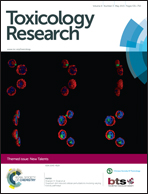Effects of benzo[a]pyrene on mouse germ cells: heritable DNA mutation, testicular cell hypomethylation and their interaction with nucleotide excision repair
Abstract
Paternal exposure to the environmental contaminant benzo[a]pyrene (B[a]P) may pose a genetic risk to future generations, because B[a]P or its metabolites can reach the testis and cause DNA damage and global hypomethylation. DNA damage and global hypomethylation can promote genomic instability in male germ cells resulting in mutations that are subsequently transmittable to offspring, especially when DNA repair is compromised. To study the ability of B[a]P to cause mutations in male germ cells and alterations in DNA methylation in testicular cells, and to investigate the relationship between these endpoints, we orally treated DNA repair deficient Xpc−/− and DNA repair proficient Xpc+/+ male mice with B[a]P or vehicle for a period of 6 weeks (13 mg kg−1 bw, 3× per week). Mice were crossed with untreated female mice 6 weeks after the last exposure to ensure the analysis of mutations originating from spermatogonial cells. Offspring tissues were collected on post-natal days 21–28. In the exposed fathers, B[a]P related DNA adducts were found in testes, indicating that the exposure reached the gonads. DNA adduct levels were similar in Xpc−/− and Xpc+/+ treated fathers. Global methylation of retrotransposable elements (LINE-1, SINE-B1 and SINE-B2) was significantly decreased in testis DNA from B[a]P treated fathers, irrespective of DNA repair genotype. Mutation rate at Ms6-hm and Hm-2 tandem repeat loci was only increased in offspring of B[a]P exposed Xpc−/− fathers. Mutation rates rose from 0.017 to 0.056 in offspring from control and treated Xpc−/− fathers, respectively (P = 0.034), whereas mutation rates were 0.028 and 0.029 in offspring from control and exposed DNA repair proficient fathers. The results indicate that B[a]P is able to induce hypomethylation in testicular DNA, and causes heritable mutations in offspring from Xpc deficient male mice. Potential health effects of paternal B[a]P exposure in offspring warrants extensive further investigation.
![Graphical abstract: Effects of benzo[a]pyrene on mouse germ cells: heritable DNA mutation, testicular cell hypomethylation and their interaction with nucleotide excision repair](/en/Image/Get?imageInfo.ImageType=GA&imageInfo.ImageIdentifier.ManuscriptID=C4TX00114A&imageInfo.ImageIdentifier.Year=2015)
- This article is part of the themed collection: New Talents

 Please wait while we load your content...
Please wait while we load your content...